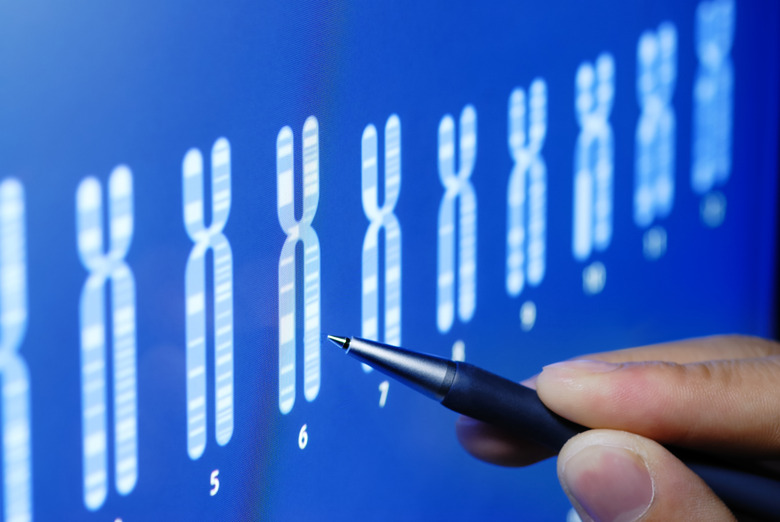Four Major Types Of Chromosomes
Deoxyribonucleic acid (DNA) is the way genetic information is stored within cells and allows the transmission of information from one generation to the next. There are four main types of chromosomes: metacentric, submetacentric, acrocentric, and telocentric. Chromosomes are found within the nucleus of most living cells and consist of DNA that is tightly wound into thread-like structures. Additional protein structures called histones support the DNA molecule within the chromosome.
Chromosomes and DNA
Chromosomes and DNA
Deoxyribonucleic acid (DNA) is the genetic code that allows information to be transferred from one generation to the next. DNA molecules consist of two linear chains that are wrapped around one another forming a double helix structure. These helical structures are further wound into chromosome structures. Chromosomes are divided into two parts with a constriction point in the in the middle which is known as the centromere. The four types of chromosomes in animal cells are classified by the position of the centromere.
Structure and Function of the Centromere
Structure and Function of the Centromere
Centromeres consist of a complex combination of proteins and DNA. They are essential to the division of cells and ensure the accurate segregation of chromosomes. Studies have demonstrated that chromosomes without centromeres segregate randomly and are eventually lost from cells. In contrast, chromosomes that have multiple centromeres can be subject to fragmentation.
Metacentric Chromosomes
Metacentric Chromosomes
Metacentric chromosomes have the centromere in the center, such that both sections are of equal length. Human chromosome 1 and 3 are metacentric.
Submetacentric Chromosomes
Submetacentric Chromosomes
Submetacentric chromosomes have the centromere slightly offset from the center leading to a slight asymmetry in the length of the two sections. Human chromosomes 4 through 12 are submetacentric.
Acrocentric Chromosomes
Acrocentric Chromosomes
Acrocentric chromosomes have a centromere which is severely offset from the center leading to one very long and one very short section. Human chromosomes 13,15, 21, and 22 are acrocentric.
Telocentric Chromosomes
Telocentric Chromosomes
Telocentric chromosomes have the centromere at the very end of the chromosome. Humans do not possess telocentric chromosomes but they are found in other species such as mice.
References
- United States National Library of Medicine: What is a chromosome?
- United States National Library of Medicine: What is DNA?
- Human Molecular Genetics: Strachan T, Read AP
- WikiBooks: Principles of Biochemistry/Chromosome and Its Structure
- Nature: Chromosome Segregation in Mitosis: The Role of Centromeres
Cite This Article
MLA
Markings, Samuel. "Four Major Types Of Chromosomes" sciencing.com, https://www.sciencing.com/four-major-types-chromosomes-14674/. 9 March 2018.
APA
Markings, Samuel. (2018, March 9). Four Major Types Of Chromosomes. sciencing.com. Retrieved from https://www.sciencing.com/four-major-types-chromosomes-14674/
Chicago
Markings, Samuel. Four Major Types Of Chromosomes last modified August 30, 2022. https://www.sciencing.com/four-major-types-chromosomes-14674/
